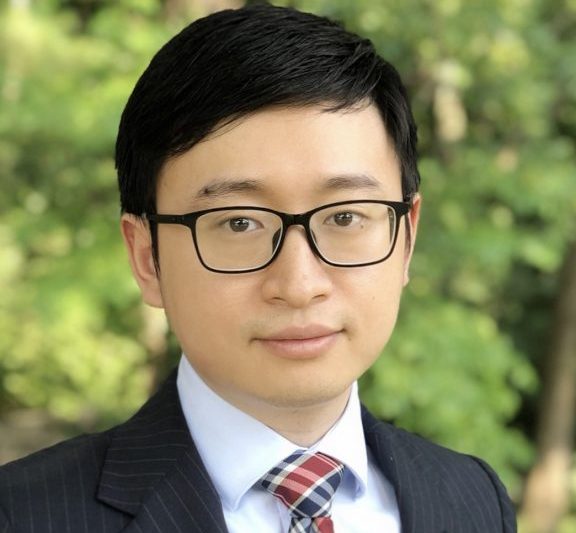Meet the Professor: Lingshu Hu Assistant Professor Lingshu Hu joined the Business Administration Department in September 2021.
“Incorporating data science methodologies into my communication research really expands the scope of the field. It provides me opportunities to examine communication patterns that were not able to be examined by scholars in the past.”
~ Lingshu Hu
Assistant Professor Lingshu Hu joined the faculty of the Washington and Lee University Business Administration Department in September 2021. With a Ph.D. in journalism focusing on computational methods and a graduate certificate in AI and machine learning, his primary teaching interests include making data analytics accessible to students in the social sciences and helping students master storytelling skills with data analytics and visualization.
Hu’s research focuses on applying and developing computational methods—such as machine learning, deep learning and natural language processing—to examine patterns of opinion expression and self-presentation in computer-mediated environments. He also conducts experiments and surveys to explore the implications of his computational findings. Hu has collaborated with scholars from and applied computational methods in social psychology, public relations, political communication and health communication. He is also an R and Python programmer and develops software to facilitate social science research.
Before pursuing his doctoral degree, Hu worked as a news editor and data journalist for four years at the Guangzhou Daily in China.
Keep reading as Hu tells us more about his research interests, passion for teaching, and what he likes to do for fun.
1. What first attracted you to Washington and Lee University?
I admire Washington and Lee University’s emphasis on interdisciplinary studies. My research is at the intersection of data science and communication. Incorporating data science methodologies into my communication research really expands the scope of the field. It provides me opportunities to examine communication patterns that were not able to be examined by scholars in the past. These opportunities have aided me in collaborating with scholars in different areas such as marketing, psychology, public relations, health communication and political communication. Working with them further inspires my research ideas and expands the implications and utility of my research. Therefore, I am excited to be able to translate data science concepts to students from various backgrounds in the Williams School.
2. What are you teaching?
This fall, I teach INTR202 Applied Statistics. In the future, I plan to create courses focusing on applying machine learning and natural language processing to business analytics.
3. Where do your research interests lie? What inspired you to research these subjects?
My research interests primarily focus on (a) computational social science methods and (b) communication patterns and effects on social media. I am interested in social media because I think it largely changed how people obtain information and connect with each other. Studying social media requires the skill of obtaining digital trace data from social media platforms. Therefore, I started to learn data science and computational methods. These provided me with the means to detect interesting patterns from mass data, and I soon recognized their beauty. It is not for nothing that these processes are often called “data mining”—in a way, they are all about finding treasures in the dirt. I really enjoy the process of finding treasures, and computational methods give me a chance to feel a pleasure that I (unfortunately) do not have in real life.
4. Aside from teaching, what’s something that you’re passionate about? What do you do for fun?
I like reading novels and watching fun videos. I also enjoy hiking and seeing natural views. I feel lucky that there are many scenic views around Lexington. I especially like the many overlook sites you can find along the mountain roads. Experiencing the valleys, mountains and clouds from these vantage points makes me reflect on how amazing nature is and how small we, as humans, truly are.
5. What is your favorite movie or book? Why?
My favorite movie is Christopher Nolan’s “Interstellar.” I like the scientific concepts it includes and the contrast and surprises it provides. For example (spoiler alert!), I had thought that the movie ended when the main character’s spaceship fell into the black hole, but Nolan bravely depicted what happened after that and resolved all of the previous cliffhangers. Though this section was later criticized for being not scientific, I think it is very brave to try to describe and explain a high-dimensional world.
6. As a student, what was the best piece of advice you were given?
I cannot list one specific piece of advice, but I did enjoy talking with my professors and getting their advice. I was unsure about my career and my true interests during my undergraduate studies. I met many professors to talk about my thoughts and anxieties and to listen to their opinions. By talking with them, I gradually realized that I wanted to be a professor.
I enjoy learning new things and sharing knowledge and ideas with others. These are key parts of being a professor and scholar. Therefore, I benefited immensely from the counsel of my professors in figuring out my career goal during my undergrad and now eventually reaching it.
7. Share a fun fact about yourself.
I don’t really like cooking, but I like to watch cooking videos. I think cooking is an amazing process—you combine ingredients into something that is, hopefully, both beautiful and delicious. However, cooking also generates a mess that I do not want to deal with. So, I like watching cooking videos: enjoying that amazing process without dealing with the mess!
If you know any W&L faculty who would be great profile subjects, tell us about them! Nominate them for a web profile.
 Lingshu Hu, Assistant Professor of Business Administration
Lingshu Hu, Assistant Professor of Business Administration
You must be logged in to post a comment.